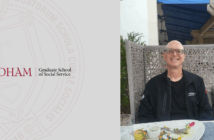Fresh out of college, Mari Timpanaro, GSS ‘14, landed a job at a Fortune 500 insurance company. She helped run the company’s events and was doing administrative work — getting to travel on the job and use the company’s expense account. She was having fun, but something was missing.
A sociology major with a psychology minor, Timpanaro didn’t know her plan after graduation. She figured her degree combination could be versatile and land her in a medley of roles. She said working for the insurance company “kind of just happened.” In 2009, just a few years after she began her position, Timpanaro had her sights set on other things.
“I was helping run an interdepartmental conference, and it was one of those feelings of, ‘this is enjoyable, but something is missing,’” Timpanaro said. “As an insurance company, we were helping people, but in a very different capacity. I wasn’t feeling fulfilled.”
A colleague noted Timpanaro’s ability to listen empathetically and provide valuable advice. They mentioned social work as a potential career path. Not interacting much with the profession before, Timpanaro wasn’t sure what opportunities were available to social workers.
“I did my research and learned the scope of what social workers do,” she said. “It’s policy. It’s lobbying. It’s clinical.”
She was sold. Timpanaro began researching Master of Social Work (MSW) programs and liked the idea of Fordham GSS’s non-matriculated path. Through this option, students can take up to two GSS MSW courses without fully enrolling in the MSW program. It allows students to experience graduate school and the social work curriculum without too much commitment. If they enjoy the coursework, they can enroll with two completed classes.
“I was able to settle in and learn about the program,” she said, “learn about the course work and gain that experience. I thought, ‘if this is what the caliber of professors are at Fordham for this program, this is where I want to be.’”
Fordham’s faculty, and one professor in particular teaching one of Timpanaro’s non-matriculated classes, was why she committed to enrolling in the MSW program.
“It changed my perspective,” Timpanaro said of the experience. “How she delivered the information, how she shared her stories. It made you want to be in the field immediately, making a difference.”
Timpanaro began her journey at Fordham as a part-time student while working full-time, something over 80% of the program’s student population does as well. It kept her busy, but she had her mind on one goal: pursuing her passions.
“On my lunch break, I would read my textbook or write a paper,” she said. “You’re trying to cram in learning as you’re also on a business trip, or you want to get home and just watch TV, but it’s like, No, I have to finish this paper. It’s a very goal-oriented thing. This is what I want to do now. I want to learn more about this. So I need to find a way.”
Later in the program, she left her job and enrolled as a full-time MSW student. She couldn’t wait to be a social worker.
Transferable Skills
Timpanaro now works as a Clinical Manager at Vibrant Emotional Health. This nonprofit organization offers state-of-the-art technology-enabled services, community wellness programs, and advocacy and education work to New Yorkers in need. Timpanaro oversees the 18 different support and crisis hotlines Vibrant utilizes, as well as its internship program.
“It’s great to help our team of brand new interns who are just getting their feet wet in the field and learning, ‘Oh, this is what social work is. This is what mental health can be,’” she said. “They’re getting real insight into the human condition.”
Timpanaro said her insurance background taught her skills in problem-solving that helped her successfully transition into social work. She said the ability to think on her feet has been vital to her accomplishments at Vibrant.
“Also being comfortable working with diverse personalities and people,” she said.
For those thinking of a career switch into social work, Timpanaro said non-matriculated study is a terrific way to enter the profession. Not only do students get an in-depth look into social work and Fordham’s curriculum, but they also get to experience being back in the classroom again. But they should be ready for a riveting and rigorous experience.
“Take a non-matriculated class to see what the course material is, and what the true intention of the work is,” she said. “Be ready to dive in feet first, and to truly put in your blood, sweat, and tears into the learning the process.”
It may take hard work and dedication, but the payoff, Timpanaro said, is far worth it.
“This is a field where all it takes is that one ‘thank you’ and you are over the moon,” she said.



